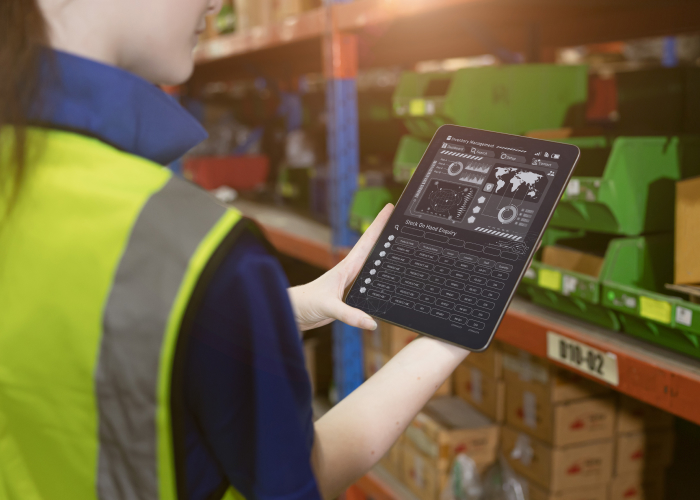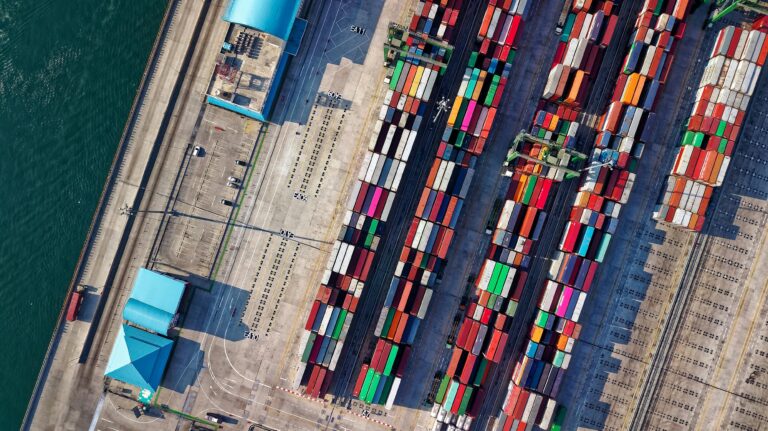The fast tempo of the logistics world puts business owners in front of complex operations and constantly increasing customer requirements. That’s why companies like Develux know well how to provide business owners with custom software solutions for the logistics world, setting innovations into this area. This article takes a look at how custom software is flying in the face of conventional wisdom and reinventing logistics management, boosting efficiency, fostering industry growth.
Addressing Key Logistics Challenges through Custom Software Development
Efficient Management of Logistics Operations

The logistics industry represents one of the main driving factors of global economic development and social progress, and the mentioned logistics activity is nowadays experiencing great transformation. The activities aiming to optimize management procedures within this dynamic changing environment are specialized in logistics solution for software development companies. These companies build tailor-made software solutions that are designed carefully to cater to the transforming business demands. This technological advancement tackles with various operational hindrances starting from simplifying diverse supply chains to enhancing real-time decisions process. Implementation of such advanced solutions propels the efficiency and productivity of logistics operations, thus their sustainability. Such practice allows flexible working environmental for logistics companies in terms of market trends, provide through cutting down environmental impacts, a sustainable supply chain network. The evolution is laid on the foundation of specialized software developers driving efficiency and strategic adaptability in the rising importance of the logistics sector.
Enhancing Warehouse and Transportation Efficiency

Logistics within warehouse management and transportation are undergoing a revolution within the logistics industry, largely based on custom software tailor-made for logistics purposes. Specialized tools are now available to streamline operations in all aspects of warehousing from inventory management to distribution making it possible for the modern logistics company to handle large volumes efficiently with apparent ease. These advanced algorithms and data analytics solutions enable way more strategic planning and execution of the transport strategies. This resultantly has the benefit not just limited to improvement in routing and management of fleets but also induces a huge cost saving. Additionally, custom software would allow one to track and monitor in real time thereby eliminating chances of logistic errors and ensuring timely deliveries whenever possible. Such innovations increase agility and adaptability in logistical activities making them able to respond fast and efficiently to market shifts or unexpected challenges. Resulting from these improvements is a direct impact whereby there is an increase in customer satisfaction level, stronger competitive position in the global market, and to make a positive contribution towards enhancing the company’s financial performance.
Integrating Industry 4.0 Technologies in Logistics

The transformation of the logistics sector originates from the extended adoption of the Industry 4.0 technologies. In this view, fintech firms play a pivotal role in the transformation process since they establish sophisticated technologies such as the Internet of Things (IoT), big data analytics, and cloud computing among other technologies within the logistics systems. Through this integration, automation increases, thereby increasing the efficiency and intelligence of logistics operations. Shipment and inventory, given real-time tracking through IoT devices, offer a previously unseen visibility as well as control over shipments and inventory. Big Data analytic enables companies to derive actionable intelligence from the vast datasets, optimizing routes, to predict what is known as demand patterns. Cloud computing enhances scalable, flexible logistics solutions, enabling handling of increasing data volume and complex operations This technological synergy will provide a more connected and transparent logistics network, based on data-based decision-making and the processes that they may be optimized. The logistics operations would thus not only become more efficient but also more adaptive to the rapidly changing dynamics of the global market, thereby setting a new standard for operational excellence in the industry.
Develux Case Study: A Testament to Custom Software Efficacy in Logistics

The Develux case study provides the illustrative example of how the custom software solutions may reimagine logistics operations fully. In this context, Develux redesigned logistics systems for one of the largest international corporations in Sweden. The old company operations bore numerous problems such as inefficient software tracking, massive interfaces, and a rigid architectural solution. Develux employed a customer specific designed software solution with regard to the customer’s requirements. This solution’s interface was user friendly and easy to use even with little or no training for most users. The real-time tracking of the solution provided unparalleled visibility on the shipping process that helped improve management accuracy for faster and accurate delivery. Not only the software matched to every one of those requirements but also seamless integration with existing company systems and continuity of operation. Scalability of the solution architecture, meeting the growth of the company and flexibility enough to meet evolving company’s needs is most the important thing that had been fulfilled while it was possible at all. This significantly improved operational efficiency as well as reducing the logistics costs of custom software implementation by a great step. In addition, it had a reaching effect of impressing on the customer with not only reliably efficient but highly transparent services. The Develux case makes the essence of fintech innovation described above absolutely clear – the essence of tailored software solutions that can be perfect in changing the industry, all whilst proving precisely that fintech innovation is what the sector needs.
Data-Driven Insights and Forecasting in Logistics

Data-based insights and precise prediction are two key factors to strategic claiming in today’s logistics landscape. These two factors have a serious impact upon the efficiency and response rate of logistics operations. This area is targeted by custom software solutions delivered by specialists of this sector. With such sophisticated software tools, logistics managers have powerful analytics tool that effectively taps data for actionable information. Such critical data enables accurate prediction of market demand, potential disruption in supply chain operations as well emerging trends. Moreover, the usage of these tools will optimize given transport routes and schedules for better timewise and cost-wise logistics operations. Including predictive analytics and machine learning algorithms imply to allow logistic managers take an intelligent decision and make it further as well which is why. Logistics firms who so heavily focus on the use of data-driven insights and prognosis positioning. tend to be more proactive in managing complexities within the supply chain to make sure that they stay ahead even as the global market constantly changes and that they always deliver with up-to-date customer needs firmly in mind.
The Future of Logistics and Software Development in Logistics

The progress of logistics is strongly linked to the advances made by companies involved in logistics software development. As this industry progresses, such companies grow extremely valuable and essential to provide custom innovative software solutions. Their specialization is invaluable in addressing both specialized and challenging issues that are occurring within the logistics sector. These companies pioneer new models of logistics making the existing ones more efficient and streamlined. Their role in adjusting to the diverse needs of the global economy hence shaping the logistics industry with agility, foresight and technological innovation is key. Looking forward, the growing importance of these software development firms in logistics sends a new age of tech-derived efficient operations as it sets pace to the novelties in the industry.
Conclusion

Specializing in logistics software development, companies which provide custom software solutions to the logistics industry are innovating and transforming its landscape. Such solutions do more than just address current complexities and challenges, they become the paving stones into the very future that is advanced yet sustainable. The use of such custom-made software solutions helps companies, like Develux, improve operations efficiency and effectiveness to a great extent. The successes portrayed in these examples go a long way in making the logistics proactive as well as sustainable in the long term, and adaptable in its nature to be coping with any change. Specialized logistics software developers will exist in increasing the depth of the industry, driving it into a new era of technological innovation and strategic vision that will define its future logistical activity.
















